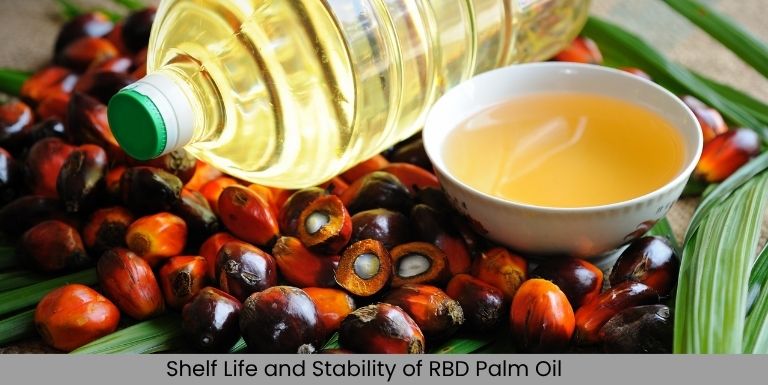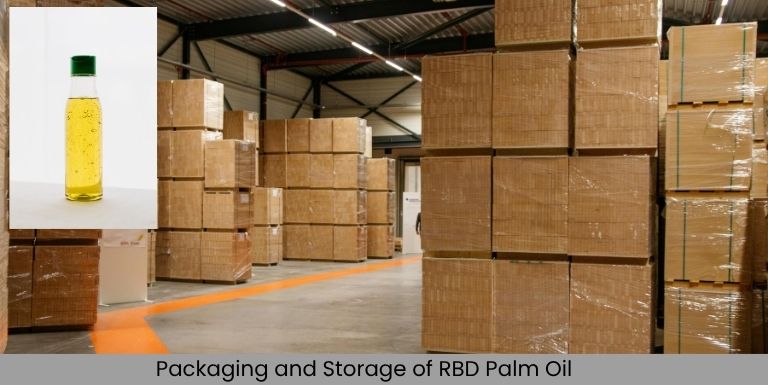Objective
This article explores the crucial quality parameters that importers in Saudi Arabia should check before purchasing RBD Palm Oil. It delves into the key factors such as certifications, physical characteristics, oxidative stability, and sustainability practices, ensuring that importers make well-informed decisions for their businesses. By the end of this article, readers will understand why Usha Edible Oil stands out as the best choice for RBD Palm Oil suppliers, providing a reliable, high-quality product suited for Saudi Arabia’s diverse industries.
RBD Palm Oil (Refined, Bleached, and Deodorized Palm Oil) is a refined and purified version of crude palm oil that has undergone a process of bleaching and deodorizing to ensure it is safe for consumption and free from impurities. The oil is used extensively in the food industry for frying, baking, and cooking purposes. It is also utilized in non-food industries such as cosmetics, cleaning products, and biofuels.
In Saudi Arabia, Palm Oil is crucial for a variety of manufacturing sectors. Food processing industries use it for products like snacks, ready-to-eat meals, and bakery items. The oil’s ability to withstand high temperatures without breaking down makes it ideal for deep frying and food preservation. In addition, the personal care and cosmetics industries in Saudi Arabia also use RBD Palm Oil for products such as soaps, shampoos, and lotions due to its moisturizing properties.
For importers in Saudi Arabia, understanding the specifications of RBD Palm Oil is critical to ensure product quality. There are several important factors to consider before making a purchase, ranging from physical characteristics to packaging standards and supplier reliability.
Key Quality Parameters for RBD Palm Oil
One of the first things importers should assess when purchasing RBD Palm Oil is its quality. The oil must meet specific standards that ensure it is safe, stable, and appropriate for its intended use. Below are some key quality parameters that importers should check before purchasing RBD Palm Oil.
Physical Characteristics of RBD Palm Oil: Cloud Point, Color, and Clarity
Cloud point is a critical physical property of Palm Oil. It refers to the temperature at which the oil starts to solidify or form a cloudy appearance. A low cloud point is desirable for oils that will be used in cooler climates, while a higher cloud point is preferred for warmer climates. Saudi Arabia, with its hot temperatures, requires RBD Palm Oil with a higher cloud point to ensure the oil remains liquid under local conditions.
Color and clarity are also essential when evaluating RBD Palm Oil. High-quality palm oil should be light in color and clear, with no cloudiness or impurities. This ensures the oil is aesthetically pleasing and free from contaminants that could affect its taste or stability.

Palm Oil’s Oxidative Stability and Shelf Life
Oxidative stability refers to the oil’s ability to resist oxidation when exposed to air, heat, and light. Oxidation leads to rancidity, which can affect both the flavor and safety of the oil. Importers in Saudi Arabia must ensure that the RBD Palm Oil they purchase has a high level of oxidative stability, especially for products used in frying and deep-frying applications. The oil should be able to withstand high temperatures and prolonged exposure to air without breaking down.
A longer shelf life is another crucial factor. RBD Palm Oil with high oxidative stability has a longer shelf life, which is especially important for large-scale food manufacturers. The oil must maintain its quality and nutritional value over time, even during extended storage periods.
Free Fatty Acids (FFA) and Moisture Content in RBD Palm Olein
Free Fatty Acids (FFA) are an important indicator of the oil’s quality. RBD Palm Oil with high FFA levels can have a sour or rancid taste, which affects the overall product. Low FFA content is a sign of fresh, high-quality oil. Importers should always check the FFA levels to ensure that the oil is not degraded and is suitable for use in food products.
Moisture content is another parameter that affects the oil’s quality and stability. Excess moisture can lead to microbial growth and accelerate oxidation, compromising the oil’s shelf life. Importers should ensure that the moisture content is within the acceptable range to maintain the oil’s quality during transport and storage.
Certifications and Standards to Look for When Importing RBD Palm Oil
Importers should always check the certifications of their RBD Palm Oil suppliers. Certifications ensure that the oil meets international quality standards and is safe for consumption. Several key certifications to look for include:
- HALAL Certification: HALAL standards guarantee that the RBD Palm Oil has been processed in accordance with internationally recognized quality management systems.
- HACCP Certification: Hazard Analysis and Critical Control Points (HACCP) certification ensures that the oil has been produced with proper safety measures to prevent contamination.
For importers in Saudi Arabia, it is essential to choose suppliers that adhere to these certifications to ensure the highest quality and safety standards.
RBD Palm Oil Variants in Saudi Arabia: Tailored to Industry Needs
In Saudi Arabia, the selection of RBD Palm Oil variants—CP6, CP8, and CP10—is essential to meet the diverse demands of local industries, each variant offering unique advantages suited for different applications.
CP6, with its low cloud point, is ideal for regions or conditions requiring clear, stable oil at cooler temperatures. This makes it perfect for premium retail oils and products where appearance matters. CP8, the most widely used variant in Saudi Arabia, serves as the go-to choice for food manufacturers, thanks to its balanced properties that make it highly effective for deep frying, baking, and everyday food production. It offers excellent stability at moderate temperatures while keeping costs competitive. Lastly, CP10, with its higher cloud point, is designed for high-heat applications. This variant is favored by large-scale industrial food producers for its superior oxidative stability, allowing it to withstand repeated frying cycles without losing quality.
The choice of these variants ensures that RBD Palm Oil not only meets the environmental conditions but also aligns with the specific needs of Saudi Arabia’s thriving food and manufacturing sectors.

Packaging and Storage Conditions of RBD Palm Oil
Packaging plays a significant role in maintaining the quality of RBD Palm Oil. The oil must be stored in appropriate containers that protect it from light, air, and contamination. Bulk shipments should be carefully handled to avoid contamination during transport.
Importers should check that the oil is packaged in clean, sealed containers, preferably in metal drums or food-grade plastic. Packaging should also clearly display relevant information, such as the batch number, production date, and expiration date, to ensure traceability and quality control.
Usha Edible Oil, known for its high-quality standards, ensures that their RBD Palm Oil is packaged in secure, tamper-proof containers and stored under optimal conditions to maintain its freshness during transit and storage.
The Importance of RBD Palm Oil’s Supplier Reputation
Choosing a reputable supplier is crucial for ensuring consistent product quality. Importers should look for suppliers with a proven track record in the industry, especially those that have been operating for several years and have built a reliable customer base.
A supplier’s reputation is built on its ability to deliver high-quality products consistently, on time, and with excellent customer service. Importers should research potential suppliers, read reviews, and request references to assess their reliability.
Usha Edible Oil stands out as a trusted supplier, known for its excellent customer support and long history of providing high-quality Vegetable Oils to various markets, including Saudi Arabia. Their commitment to sustainability and ethical sourcing practices ensures that importers receive the best products, every time.
Conclusion: Why Usha Edible Oil is the Best Choice for RBD Palm Oil in Saudi Arabia
When looking for high-quality RBD Palm Oil in Saudi Arabia, Usha Edible Oil emerges as the best choice for importers. The company’s RBD Palm Oil is produced in accordance with international quality standards and certifications, including HALAL, HACCP, and RSPO. With its commitment to sustainability, ethical sourcing, and customer satisfaction, Usha Edible Oil offers the best RBD Palm Oil for Saudi Arabian industries.
By choosing Usha Edible Oil, importers can be assured of the highest quality, reliability, and sustainability, ensuring the success of their businesses and the satisfaction of their customers. Usha’s dedication to maintaining top-tier standards makes it a trusted partner for all your RBD Palm Oil needs.
Frequently Asked Questions (FAQs)
What are the key quality parameters to check before purchasing RBD Palm Oil?
Importers should check the cloud point, color, clarity, oxidative stability, free fatty acid content, and moisture levels to ensure the oil meets quality and shelf-life requirements.
How does Usha Edible Oil ensure high-quality RBD Palm Oil?
Usha Edible Oil ensures high-quality RBD Palm Oil through strict adherence to international standards, including HACCP, and RSPO certifications, as well as robust quality control processes.
Is RBD Palm Oil suitable for deep frying in Saudi Arabia?
Yes, RBD Palm Oil is ideal for deep frying due to its high oxidative stability and resistance to breakdown under high heat, making it perfect for Saudi Arabian food processing industries.
What certifications should importers look for in RBD Palm Oil?
Importers should look for certifications like HALAL, HACCP, and RSPO, which guarantee the oil meets international quality and sustainability standards.
Why should importers choose Usha Edible Oil for RBD Palm Oil?
Usha Edible Oil stands out for its consistent quality, sustainability practices, reliable supply chain, and excellent customer service, making it the top choice for importers in Saudi Arabia.
Author Bio

Sales Manager
Muhammad Usman, Sales Manager at Usha Edible Oil, combines years of industry experience with a strong focus on customer relationships. His expertise ensures that Usha Edible Oil delivers high-quality products, including RBD Palm Oil (CP6, CP8 and CP10), RBD Coconut Oil, Specialty Fats, Vegetable Shortening, Vegetable Ghee, and Margarine, to meet the diverse needs of global markets.
With a commitment to excellence, Muhammad continues to lead Usha Edible Oil in providing innovative and reliable vegetable oils, specialty fats, vegetable shortening, vegetable ghee, margarine export to various countries worldwide including Saudi Arabia, United Arab Emirates (UAE), Egypt, Syria, Qatar, Kuwait, Oman, Bahrain, Yemen, Iraq, Iran, Jordan, Lebanon, Palestine, Turkey, Sudan, solidifying its position as a trusted manufacturer, exporter, and wholesale supplier in the food industry.


